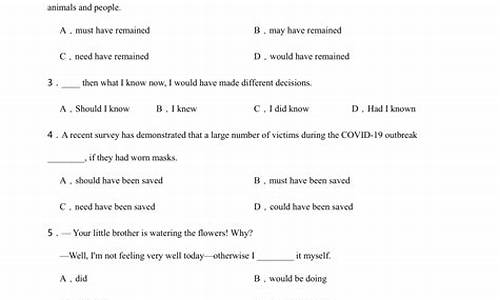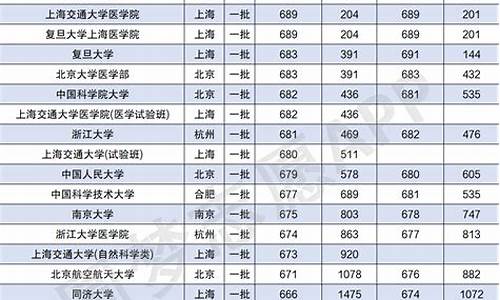您现在的位置是: 首页 > 教育政策 教育政策
高考虚拟语气讲解-高考英语 虚拟语气
tamoadmin 2024-08-05 人已围观
简介1.在英语高考中最全面的虚拟语气的用法2.高考英语之虚拟语气归纳整理的第一类3.高考英语之虚拟语气归纳整理的wish和as if4.高考英语之虚拟语气归纳整理的注意事项5.高考英语语法:高中英语语法-浅谈虚拟语气的特殊用法在英语高考中最全面的虚拟语气的用法① 虚拟现在时表示与现在事实相反的设,其if 从句的谓语形式用动词的过去式(be 一般用were),主句用would/ should/ coul
1.在英语高考中最全面的虚拟语气的用法
2.高考英语之虚拟语气归纳整理的第一类
3.高考英语之虚拟语气归纳整理的wish和as if
4.高考英语之虚拟语气归纳整理的注意事项
5.高考英语语法:高中英语语法-浅谈虚拟语气的特殊用法
在英语高考中最全面的虚拟语气的用法

① 虚拟现在时表示与现在事实相反的设,其if 从句的谓语形式用动词的过去式(be 一般用were),主句用would/ should/ could/ might +动词原形,例如:If I were in your position I would marry her.
② 虚拟过去时是表示与过去事实相反的设,if 从句的谓语形式用过去完成时即had+过去分词,主句用would / should / could / might + he +过去分词,例如:If it had not rained so hard yesterday we could he played tennis.
③ 大多数的虚拟条件句属于上面三种情况的一种,但并不排除存在条件和后果中,一个和现在情况相反,另一个和过去情况相反,例如:If you had followed what the doctor said, you would not be so painful now.过去的选择对现在造成了后果。
还有一种因为违反常理而不会发生的事情,比如不日出,if句用过去时,主句用would加动词
高考英语之虚拟语气归纳整理的第一类
虚拟语气在条件句中的用法:
条件句有真实条件句和虚拟条件句两种。真实条件句所表示的设是有可能发生的,此时主句不用虚拟语气;而虚拟条件句则表示一种想,与事实相反或不大可能会发生,此时用虚拟语气。如:
If I he time,I will go. 若我有时间,我就去。 (陈述语气) If I were you,I would go. 若我是你,我就去。 (虚拟语气 ) 时态类型 主句谓语形式 条件句的谓语形式 例句 与现在事实相反 would/should/could/might+ V原形 动词过去式 did
*be 多用were 1. If I were you, I should study English.
2. I would certainly go if I had time. 与过去事实相反 would/should/could/might + he done 动词过去完成式
had done 1. If you had taken my advice, you would not he failed in the test.
2. If I had left a little earlier, I would he caught the train. 与将来事实相反 would/should/could/might + V原形 ①动词过去式
②should +V原
③were + to do 1.If you came tomorrow, we would he the meeting. ①
2. If it were to rain tomorrow, the meeting would be put off.③ *规律总结:从句都往过去推一个时态,如:与现在相反的if从句就用过去时;与过去相反用过去完成时(即过去的过去)
注:特别说明
1、l would/should/could/might主句谓语中的should主要用于第一人称后;would表示结果还表示过去经常常常做某事,might表示可能性,could表示能力、允许或可能性。比较:
If you tried again ,you would succeed. 要是你再试一试,你就会成功的。 (would表结果)
If you tried again, you might succeed. 要是你再试一试,你可能会成功的。 (might表可能)
If you tried again ,you could succeed. 要是你再试一试,你就能成功了。(could表能力)
2、错综时间虚拟条件句 即条件从句与主句所指时间不一致,如从句指过去,而主句即指的是现在或将来,此时应根据具体的语境情况,结合上面提到的三种基本类型对时态作相应的调整:
If it had rained last night, the ground would be wet now. 要是昨晚下过雨的话,现在地面就会是湿的。
You would be much better now if you had taken my advice. 若你当时听我的话,你现在就会好多了。
3、If虚拟条件句的否定(含蓄条件句) 常考两个句型:If it weren’t for…和If it hadn’t been for…,其意为“若不是(有)” “要不是”。如:
If it weren’t for water, no plant could grow. 要是没有水植物就无法生长。
If it hadn’t been for your assistance ,we wouldn’t he succeeded.
=But for your assistance ,we wouldn’t he succeeded.
=Without your assistance ,we wouldn’t he succeeded.如果没有你的帮助,我们不会成功的。
4、If虚拟条件句的倒装形式,即把were, had, should置于句首。例:
Were I in school again (= If I were in school again), I would work harder.如果我能再上一次学,我会学习得更努力。
Had you asked me, I would he told you. (=If you had asked me,…)如果你问我,我会告诉你。
高考英语之虚拟语气归纳整理的wish和as if
1.表示与现在事实相反的愿望
构成:主语 + wish (that) + 从句主语 + 动词过去式 (be 一律用were)
例如:I wish I knew everything in the world.我希望我知道世界上所有的事。
I wish that the experiment were a success.我希望这个实验是成功的。
We wish we had wings.我们希望有翅膀。
2.表示与过去事实相反的愿望
构成:主语 + wish (that) + 从句主语 + would/could + he + 过去分词或had + 过去分词
例如:I wish that you hadcome yesterday.我希望你昨天来过。
I wish that I could he gone with you last night.我希望我昨晚能和你一起去。
I didn’t go to the party, but I do wish I had been there.我没有去参加晚会,但是我真的希望我去过那里。
3.表示将来不大可能实现的愿望
构成:主语 + wish (that) + 从句主语 + would/should/could/might + 原形动词
例如:I wish that he could try again.我希望他能再次尝试。
I wish that someday I should live on the moon.
We wish that they would come soon.
II. ASif 引出的虚拟。
As if….表好像……我们经常会利用一下句型来表达不能实现的虚拟状态:It is as if……。 (就好象是……)
As if + 从句, 主句。 (好像…… Sb.+ do…)表达一种设的条件。而 As if 之后的设内容的语法结构和wish虚拟的结构一样。
L. 33 A Day to Remember 中原句, “As if this were not enough to reduce you to tears, your husband arrives.” 就利用了和现在事实相反的设虚拟。北京新东方名师指出,要善于总结出一些学习语法的技巧,如利用对比,举例等方法进行学习。
注:Something is to hened,I'm to face it。
高考英语之虚拟语气归纳整理的注意事项
使用虚拟条件句时要注意的几点:
1.当条件状语从句表示的行为和主句表示的行为所发生的时间不一致时,被称为“错综时间条件句”,动词的形式要根据它所表示的时间作出相应的调整。如:
If you had followed my advice just now, you would be better now.
If you had studied hard before, you would be a college student now, and you would graduate from a college in four years’ time.
2.if 省略句
在条件句中可省略if, 把were, had, should提到句首 , 变为倒装句式。如:
If I were at school again, I would study harder.
→ Were I at school again, I would study harder.
If you had come earlier, you would catch the bus.
→ Had you come earlier, you would catch the bus.
If it should rain tomorrow, we would not go climbing.
→ Should it rain tomorrow, we would not go climbing.
注意:若省略的条件句中的谓语动词是否定形式时,不能用动词的缩略形式。如:我们可以说:Were it not for the expense, I would go abroad now. 但不能说:Weren't it for the expense, I would go abroad now.
3.用介词短语代替条件状语从句。常用的介词有with, without, but for。如:
What would you do with a million dollars? ( = if you had a million dollars)
We couldn't he finished the work ahead of time without your help. ( = if we hadn't got your help)
But for the rain ( = If it hadn't been for the rain ), we would he finished the work.
4.含蓄条件句
有时为了表达的需要,在虚拟语气中并不总是出现if引导的条件句,而通过其他手段来代替条件句。
I was ill that day. Otherwise, I would he taken part in the sports meet. (副词)
He telephoned to inform me of your birthday, or I would he known nothing about it. (连词)
A man who stopped drinking water would be dead in about seven days. (定语从句)
I might he given you more help, but I was too busy. (连词)
Everything taken into consideration, they would he raiser their output quickly. (独立主格结构)
混合型与含蓄型虚拟语气
1。混合型虚拟语气:
当虚拟条件从句与结果主语所表达的时间不一致时,被称为“混合条件句”,这种虚拟语气被称为“混合型虚拟语气”,动词的形式要根据它所表达的时间作相应调整。如:
If you had followedthe doctor's advice ,he would be all right now.(条件从句表达的时间是过去,因此用had+过去分词;主句表示的时间是现在,因此用would+动词原形)
2.含蓄型虚拟语气:
有时候,虚拟条件不是通过if引导的条件句来表示,而是暗含在上下文中
(1).用but for 、without(如果没有)等来代替条件从句,如
Without electricity human life would be quite different=If there were no electricity ,human life would be quite different
(2) 用otherwise、or(or else),even though等表示与上文的情况相反,从而引出虚拟语气。如:
I lost your address.Otherwise,I would he visited you long before. =I lost your address.If I hadn't lost your address ,I would he visited you long before.
(3) 虚拟条件通过but暗示出来。如:
He would he given you more help,but he was too busy
他本来会给你更多的帮助,但是他太忙了。也就是说,如果那时他不忙,他可以给你更多的帮助。句中but he was too busy实际上暗示了一个虚拟条件——如果那时他不忙
He would lose weight,but he eats too much
他本来可以减肥的,但是他吃的太多了。也就是说,如果他吃得不多的话,他是可以减肥的。句中的but he eats too much实际上暗示了一个虚拟条件——如果他吃得不多。
高考英语语法:高中英语语法-浅谈虚拟语气的特殊用法
《高中英语语法-浅谈虚拟语气的特殊用法》由英语我整理,更多请访问:s://.liuxue86/english/。本内容整理时间为05月12日,如有任何问题请联系我们。
浅谈虚拟语气的特殊用法
1. 当虚拟条件从句中的谓语动词和主句中的谓语动词发生的时间不一致时,主句和从句的谓语动词应根据实际的时间选用适当的动词形式。如:
If you had earned enough money,you would live a hy life in the future.
如果你已挣了足够的钱,你今后就会过上幸福的生活。
(从句与过去事实相反,谓语动词用过去完成时;主句与将来事实相反,谓语动词用? would/should/could/might+ 动词原形?。)
2. 在虚拟语气中,有时设的情况并不是以条件状语从句的形式表示,而是通过相应的介词或连词来表示,如 without, but for, or, but, otherwise 等。如:
But for your help,we couldn?t he finished the task in time. (= If you hadn?t helped us? tomorrow?)
要不是你的帮助,我们就不会按时完成任务。
3. 在 if 引导的虚拟条件句中,如果条件状语从句位于句首,且从句中含有 were, had 或 should ,则可以省略 if ,并用倒装结构。如:
Should it rain tomorrow,we would he to stay at home. (= If it should rain tomorrow?)
如果明天下雨,我们就得呆在家里。
4. 如果主句中含有 would rather, would as soon, would sooner 或 would prefer ,则从句要用过去时表示当时或将来的情况,用过去完成时表示过去的情况,表达希望或婉转的责备。如:
I would prefer he worked hard.
我倒希望他能够努力学习。
I would just as soon you had returned the book yesterday.
我真希望你昨天把这本书还了。
5. 在? It?s (high/ about) time + that 从句?中, that 从句的谓语动词要用虚拟语气,表示?是该?的时候了?,其形式为一般过去时或? should + 动词原形?,但 should 不能省略。如:
It?s time that we began our meeting.
是该开会的时候了。
It is high time that we should tell him the truth.
是我们该告诉他真相的时候了。
6. 在表示建议、命令、要求、坚持( suggest , order , demand , propose , request , command , insist )等相关的名词性从句中,谓语动词要用虚拟语气? (should) + 动词原形?。如:
The order that we should reach the small village before daybreak came just now.
要求我们在天亮之前赶到小村庄的命令刚刚下达。(同位语从句)
The suggestion is that we (should) recite a passage each day.
建议是我们每天应背诵一篇短文。(表语从句)
It is demanded that we (should) get everything ready by tonight.
我们被要求今晚之前把一切都准备好。(主语从句)
7. 在? It is + 形容词 + that 从句?中,从句的谓语动词要用虚拟语气? (should) + 动词原形?。这类形容词有 necessary, important, essential, strange, natural 等。如:
It is necessary that he (should)be sent to the hospital at once.
立刻送他进医院是非常必要的。
8. 由 wish 引起的表示愿望的宾语从句,其谓语要用虚拟语气。当 wish 表示的是与现在或当时事实相反的愿望时,它所引起宾语从句的谓语动词要用一般过去时或过去进行时;当 wish 表示的是与过去事实相反的愿望时,它所引起宾语从句的谓语动词要用过去完成时;当 wish 表示的是将来难以实现的愿望时,它所引起宾语从句的谓语动词要用? would/ should/ could/ might + 动词原形?。如:
I wish I had enough money to buy a car.
我希望能有足够的钱来买一辆小汽车。(表示的是现在)
He whishes he had not lost the chance.
他真希望没有失去机会。(表示的是过去)
I wish I would join the army when I grow up.
我希望长大后能够参军。(表示的是将来)
9. 在 insist 和 suggest 后的宾语从句中常用虚拟语气表示建议、要求或命令。但当 insist 表示?坚称;主张?时,宾语从句要用陈述语气;当 suggest 表示?表明;暗示?时,宾语从句也要用陈述语气。如:
She insisted that she had seen a thief climb into the house through the window.
她坚持说她曾看见一个小偷从窗口爬进了房间。
The smile on his face suggested that he had passed the exam.
他脸上的微笑表明他已通过了考试。
10. 在 as if / as though 引导的状语从句表示的是非真实情况时,从句的谓语动词要用过去时或过去完成时。如:
She talked about the film as if she had really seen it.
她谈论那部影片,就好像她确实看过一样。
安徽?梁静渊 《高中英语语法-浅谈虚拟语气的特殊用法》由英语我整理,更多请访问:s://.liuxue86/english/









